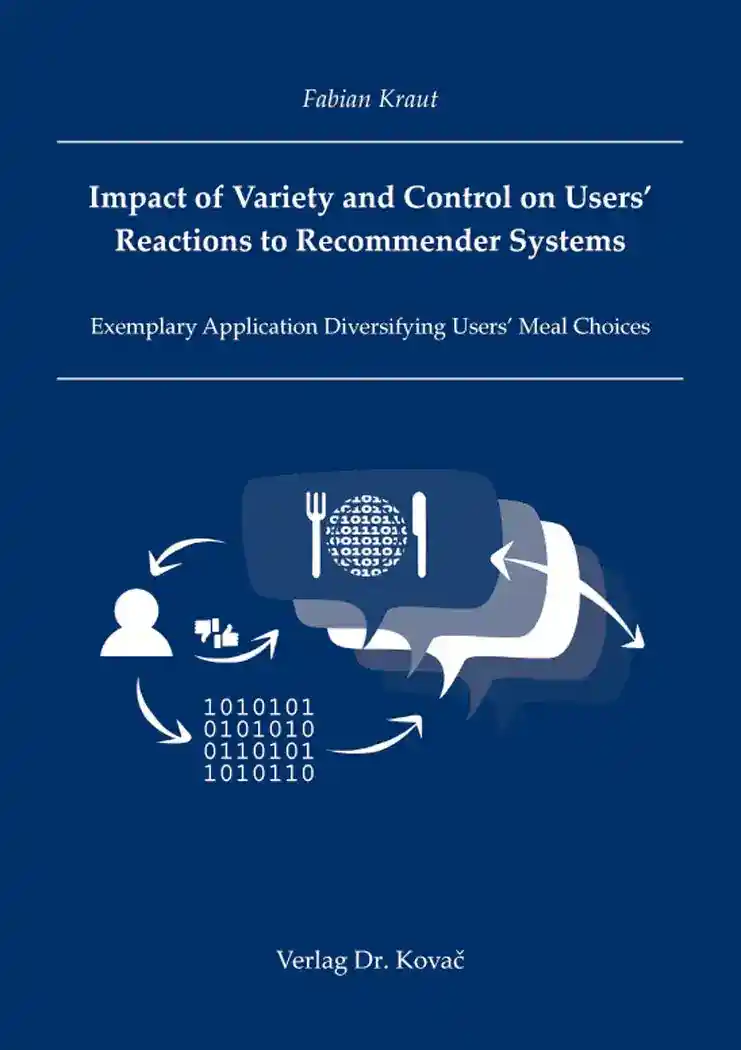Fabian KrautImpact of Variety and Control on Users’ Reactions to Recommender Systems
Exemplary Application Diversifying Users’ Meal Choices
Schriftenreihe innovative betriebswirtschaftliche Forschung und Praxis, volume 541
Hamburg 2021, 654 pages
ISBN 978-3-339-12068-7 (print) |ISBN 978-3-339-12069-4 (eBook)
About this book deutschenglish
Recommender systems are web-based software tools and techniques that aim to support users’ decision-making by suggesting items that are of potential interest to users. For various industry-shaping companies like Amazon, Netflix, YouTube, Spotify, Coursera, Zalando, or Booking.com, recommender systems play an essential role in their business processes and are deemed to provide a competitive advantage. Most recommender systems focus on ACCURACY, i.e., identifying the item that has the highest utility for the user based on known user preferences. Yet, focusing on ACCURACY often leads to monotonous, unsurprising recommendations. Thus, research has proposed that recommender systems should consider other relevant criteria such as VARIETY. However, making recommendations which allow for VARIETY but are potentially less accurate might lead to negative user reactions (e.g., reactance). Allowing users to update recommendations and thereby evoking the feeling of CONTROL might address such reactions.
This thesis aims to develop a recommender system that considers VARIETY next to ACCURACY as well as a mechanism for USER CONTROL and to examine whether considering VARIETY and USER CONTROL in a recommender system improves the system’s performance with respect to user evaluations.
The author developed a recommender system for meal choices that makes recommendations for a healthy diet. This thesis argues that systematically increasing variety next to accuracy-orientation in recommendations can stimulate non-monotonous, positively surprising recommendations that are still accurate and ultimately satisfy users more than rather monotonous counterparts. Likewise, this thesis argues that giving users restricted exchange control over their recommendations resolves the tyranny of choice problem, namely freedom of choice vs. liberation from choice, and positively influences users’ evaluations of those recommendations as well as their overall evaluation of the underlying recommender system. A large-scale online experiment with more than 1,000 users investigates the performance of recommender systems with varying degrees of variety in recommendations and with no vs. restricted user control over recommendations.
Results stress the importance of giving users restricted control over their recommendations and increasing variety to trigger positively surprising recommendations. Thus, firms using recommender systems should increase variety in recommendations and include user control in the recommendation process. Research is encouraged to shift focus more towards studying actual user-experiences rather than primarily optimizing accuracy metrics.
Keywords
AbwechslungAccuracyConsumer BehaviorDecision Support SystemsEmpfehlungssystemeGenauigkeitKonsumentenverhaltenLibertarian PaternalismMarketingMeal PlanningNudgingNutzerkontrolleRecommendation SystemsRecommender SystemsSpeiseplanungUser ControlVarietyVielfaltWirtschaftsinformatikIhr Werk im Verlag Dr. Kovač

Möchten Sie Ihre wissenschaftliche Arbeit publizieren? Erfahren Sie mehr über unsere günstigen Konditionen und unseren Service für Autorinnen und Autoren.
